-2024届高考英语作文复习专项读后续写写作技巧总结 讲义
文档属性
| 名称 | -2024届高考英语作文复习专项读后续写写作技巧总结 讲义 | 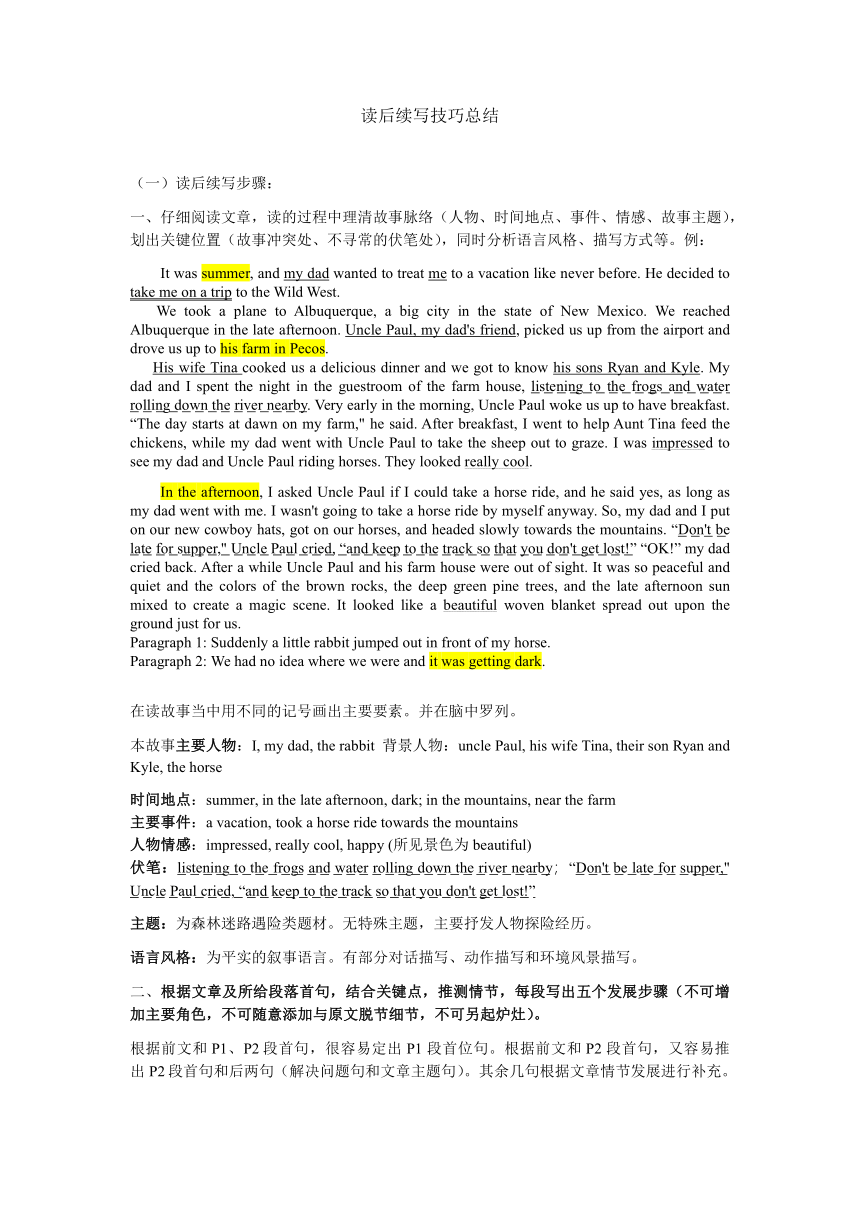 | |
| 格式 | docx | ||
| 文件大小 | 40.7KB | ||
| 资源类型 | 教案 | ||
| 版本资源 | 通用版 | ||
| 科目 | 英语 | ||
| 更新时间 | 2024-04-16 16:47:08 | ||
图片预览

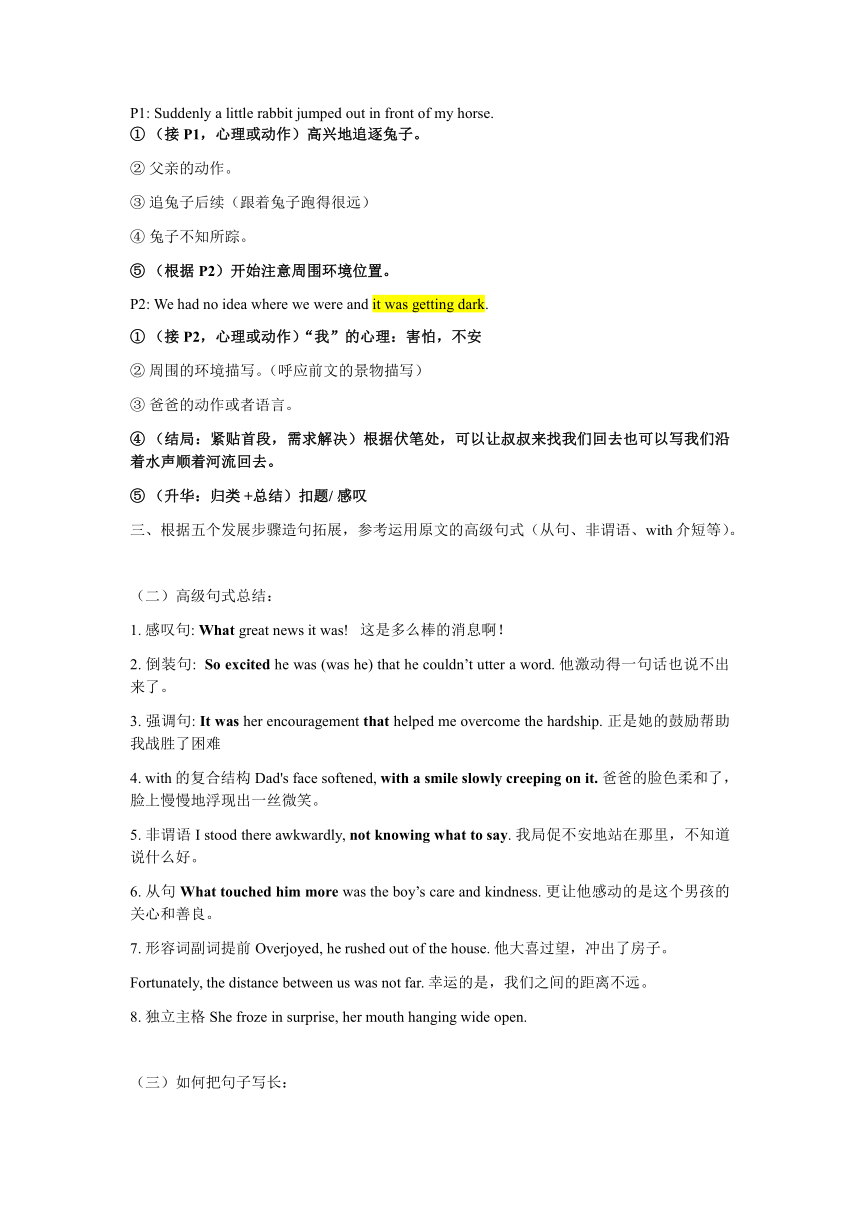
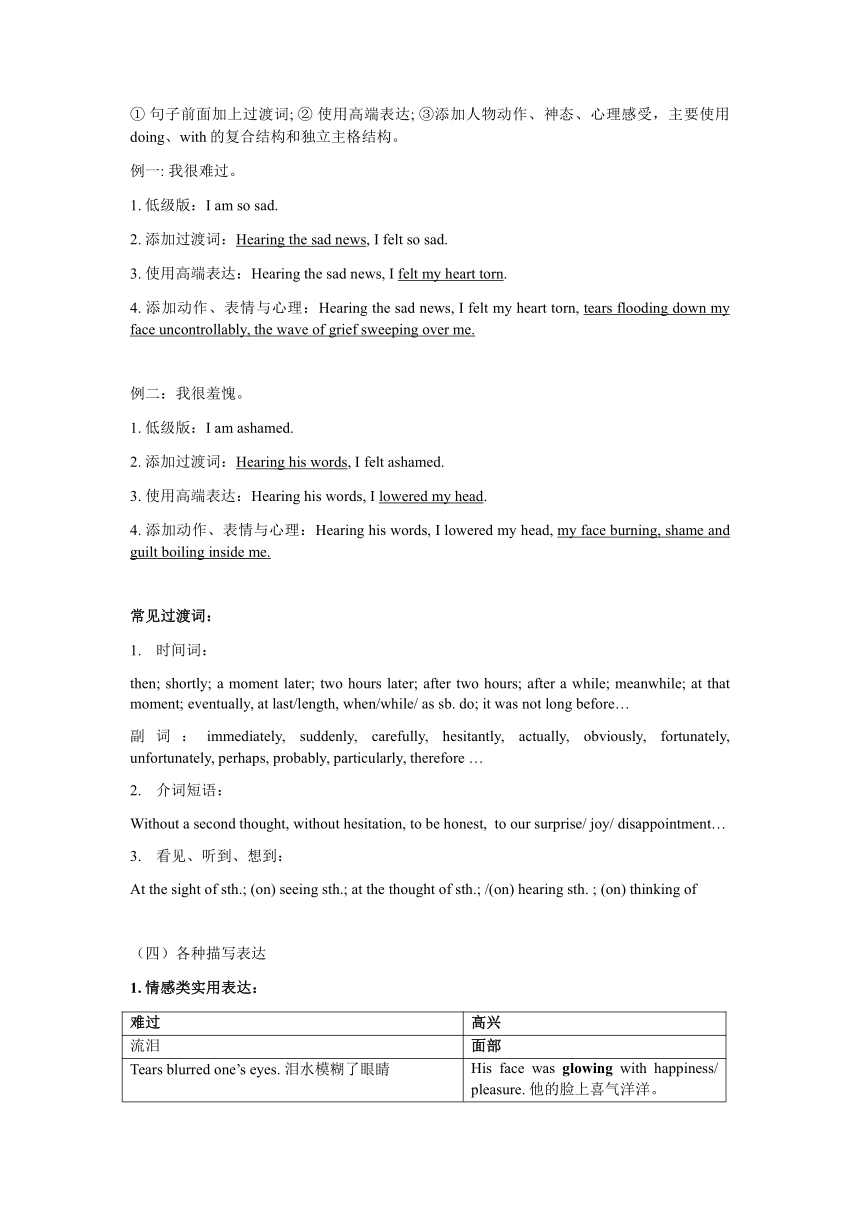
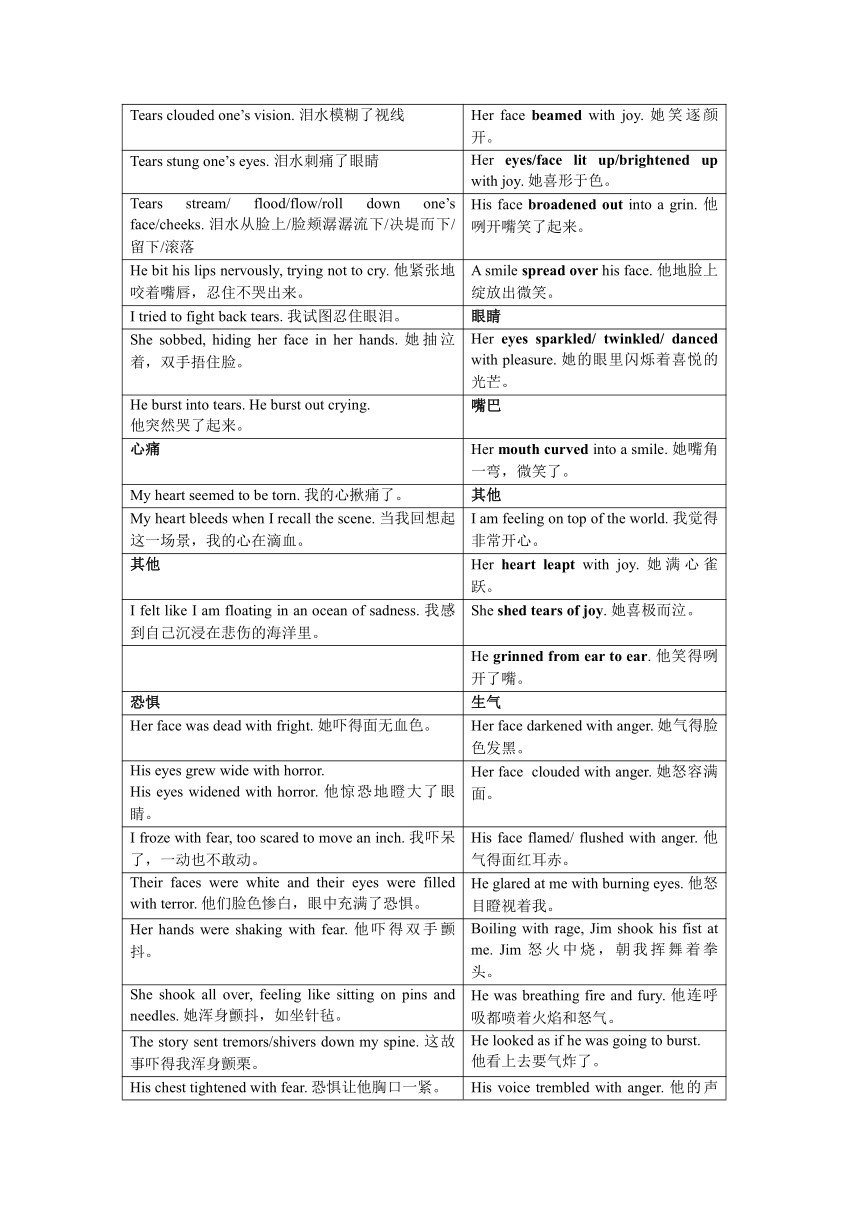
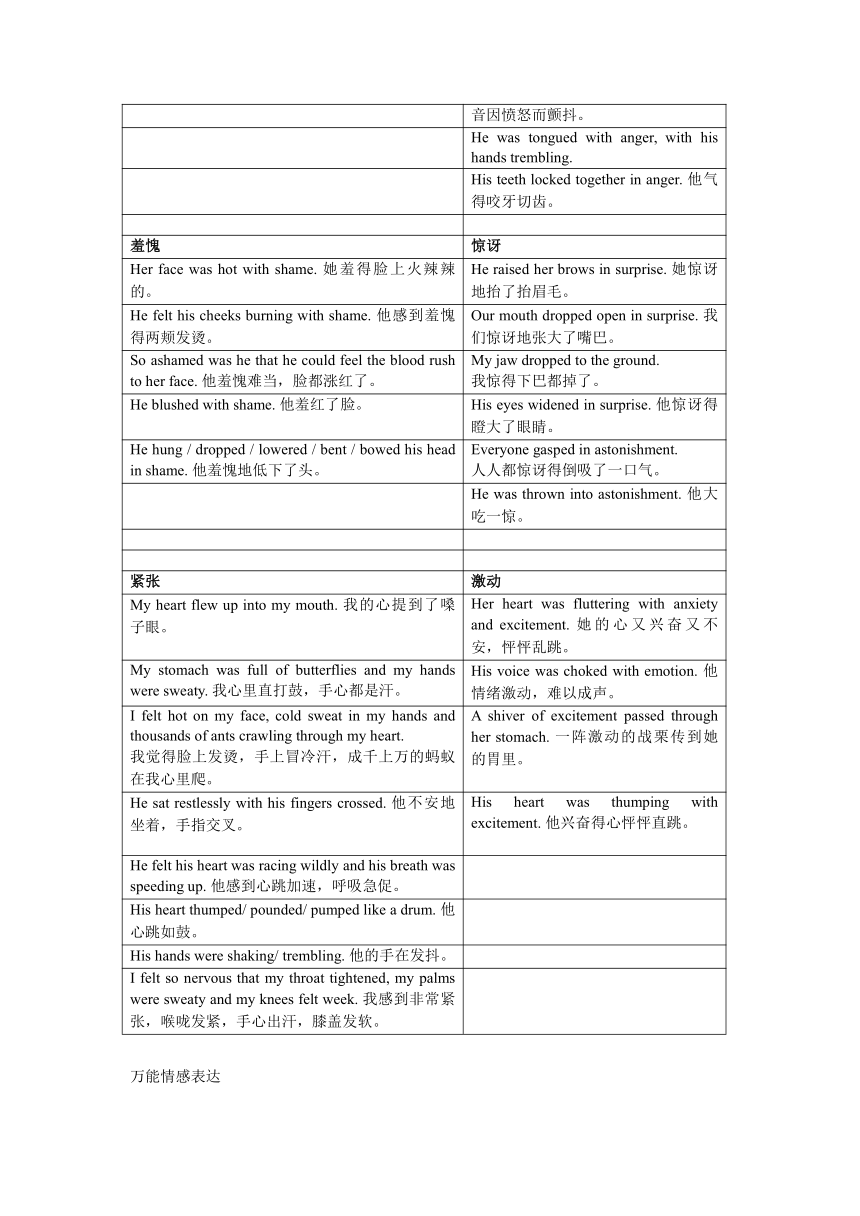
文档简介
读后续写技巧总结
(一)读后续写步骤:
一、仔细阅读文章,读的过程中理清故事脉络(人物、时间地点、事件、情感、故事主题),划出关键位置(故事冲突处、不寻常的伏笔处),同时分析语言风格、描写方式等。例:
It was summer, and my dad wanted to treat me to a vacation like never before. He decided to take me on a trip to the Wild West.
We took a plane to Albuquerque, a big city in the state of New Mexico. We reached Albuquerque in the late afternoon. Uncle Paul, my dad's friend, picked us up from the airport and drove us up to his farm in Pecos.
His wife Tina cooked us a delicious dinner and we got to know his sons Ryan and Kyle. My dad and I spent the night in the guestroom of the farm house, listening to the frogs and water rolling down the river nearby. Very early in the morning, Uncle Paul woke us up to have breakfast. “The day starts at dawn on my farm," he said. After breakfast, I went to help Aunt Tina feed the chickens, while my dad went with Uncle Paul to take the sheep out to graze. I was impressed to see my dad and Uncle Paul riding horses. They looked really cool.
In the afternoon, I asked Uncle Paul if I could take a horse ride, and he said yes, as long as my dad went with me. I wasn't going to take a horse ride by myself anyway. So, my dad and I put on our new cowboy hats, got on our horses, and headed slowly towards the mountains. “Don't be late for supper," Uncle Paul cried, “and keep to the track so that you don't get lost!” “OK!” my dad cried back. After a while Uncle Paul and his farm house were out of sight. It was so peaceful and quiet and the colors of the brown rocks, the deep green pine trees, and the late afternoon sun mixed to create a magic scene. It looked like a beautiful woven blanket spread out upon the ground just for us.
Paragraph 1: Suddenly a little rabbit jumped out in front of my horse.
Paragraph 2: We had no idea where we were and it was getting dark.
在读故事当中用不同的记号画出主要要素。并在脑中罗列。
本故事主要人物:I, my dad, the rabbit 背景人物:uncle Paul, his wife Tina, their son Ryan and Kyle, the horse
时间地点:summer, in the late afternoon, dark; in the mountains, near the farm
主要事件:a vacation, took a horse ride towards the mountains
人物情感:impressed, really cool, happy (所见景色为beautiful)
伏笔:listening to the frogs and water rolling down the river nearby;“Don't be late for supper," Uncle Paul cried, “and keep to the track so that you don't get lost!”
主题:为森林迷路遇险类题材。无特殊主题,主要抒发人物探险经历。
语言风格:为平实的叙事语言。有部分对话描写、动作描写和环境风景描写。
二、根据文章及所给段落首句,结合关键点,推测情节,每段写出五个发展步骤(不可增加主要角色,不可随意添加与原文脱节细节,不可另起炉灶)。
根据前文和P1、P2段首句,很容易定出P1 段首位句。根据前文和P2 段首句,又容易推出P2段首句和后两句(解决问题句和文章主题句)。其余几句根据文章情节发展进行补充。
P1: Suddenly a little rabbit jumped out in front of my horse.
① (接P1,心理或动作)高兴地追逐兔子。
② 父亲的动作。
③ 追兔子后续(跟着兔子跑得很远)
④ 兔子不知所踪。
⑤ (根据P2)开始注意周围环境位置。
P2: We had no idea where we were and it was getting dark.
① (接P2,心理或动作)“我”的心理:害怕,不安
② 周围的环境描写。(呼应前文的景物描写)
③ 爸爸的动作或者语言。
④ (结局:紧贴首段,需求解决)根据伏笔处,可以让叔叔来找我们回去也可以写我们沿着水声顺着河流回去。
⑤ (升华:归类 +总结)扣题/ 感叹
三、根据五个发展步骤造句拓展,参考运用原文的高级句式(从句、非谓语、with介短等)。
(二)高级句式总结:
1. 感叹句: What great news it was! 这是多么棒的消息啊!
2. 倒装句: So excited he was (was he) that he couldn’t utter a word. 他激动得一句话也说不出来了。
3. 强调句: It was her encouragement that helped me overcome the hardship. 正是她的鼓励帮助我战胜了困难
4. with的复合结构 Dad's face softened, with a smile slowly creeping on it. 爸爸的脸色柔和了,脸上慢慢地浮现出一丝微笑。
5. 非谓语 I stood there awkwardly, not knowing what to say. 我局促不安地站在那里,不知道说什么好。
6. 从句 What touched him more was the boy’s care and kindness. 更让他感动的是这个男孩的关心和善良。
7. 形容词副词提前 Overjoyed, he rushed out of the house. 他大喜过望,冲出了房子。
Fortunately, the distance between us was not far. 幸运的是,我们之间的距离不远。
8. 独立主格 She froze in surprise, her mouth hanging wide open.
(三)如何把句子写长:
① 句子前面加上过渡词; ② 使用高端表达; ③添加人物动作、神态、心理感受,主要使用doing、with的复合结构和独立主格结构。
例一: 我很难过。
1. 低级版:I am so sad.
2. 添加过渡词:Hearing the sad news, I felt so sad.
3. 使用高端表达:Hearing the sad news, I felt my heart torn.
4. 添加动作、表情与心理:Hearing the sad news, I felt my heart torn, tears flooding down my face uncontrollably, the wave of grief sweeping over me.
例二:我很羞愧。
1. 低级版:I am ashamed.
2. 添加过渡词:Hearing his words, I felt ashamed.
3. 使用高端表达:Hearing his words, I lowered my head.
4. 添加动作、表情与心理:Hearing his words, I lowered my head, my face burning, shame and guilt boiling inside me.
常见过渡词:
时间词:
then; shortly; a moment later; two hours later; after two hours; after a while; meanwhile; at that moment; eventually, at last/length, when/while/ as sb. do; it was not long before…
副词:immediately, suddenly, carefully, hesitantly, actually, obviously, fortunately, unfortunately, perhaps, probably, particularly, therefore …
介词短语:
Without a second thought, without hesitation, to be honest, to our surprise/ joy/ disappointment…
看见、听到、想到:
At the sight of sth.; (on) seeing sth.; at the thought of sth.; /(on) hearing sth. ; (on) thinking of
(四)各种描写表达
1. 情感类实用表达:
难过 高兴
流泪 面部
Tears blurred one’s eyes. 泪水模糊了眼睛 His face was glowing with happiness/ pleasure. 他的脸上喜气洋洋。
Tears clouded one’s vision. 泪水模糊了视线 Her face beamed with joy. 她笑逐颜开。
Tears stung one’s eyes. 泪水刺痛了眼睛 Her eyes/face lit up/brightened up with joy. 她喜形于色。
Tears stream/ flood/flow/roll down one’s face/cheeks. 泪水从脸上/脸颊潺潺流下/决堤而下/留下/滚落 His face broadened out into a grin. 他咧开嘴笑了起来。
He bit his lips nervously, trying not to cry. 他紧张地咬着嘴唇,忍住不哭出来。 A smile spread over his face. 他地脸上绽放出微笑。
I tried to fight back tears. 我试图忍住眼泪。 眼睛
She sobbed, hiding her face in her hands. 她抽泣着,双手捂住脸。 Her eyes sparkled/ twinkled/ danced with pleasure. 她的眼里闪烁着喜悦的光芒。
He burst into tears. He burst out crying. 他突然哭了起来。 嘴巴
心痛 Her mouth curved into a smile. 她嘴角一弯,微笑了。
My heart seemed to be torn. 我的心揪痛了。 其他
My heart bleeds when I recall the scene. 当我回想起这一场景,我的心在滴血。 I am feeling on top of the world. 我觉得非常开心。
其他 Her heart leapt with joy. 她满心雀跃。
I felt like I am floating in an ocean of sadness. 我感到自己沉浸在悲伤的海洋里。 She shed tears of joy. 她喜极而泣。
He grinned from ear to ear. 他笑得咧开了嘴。
恐惧 生气
Her face was dead with fright. 她吓得面无血色。 Her face darkened with anger. 她气得脸色发黑。
His eyes grew wide with horror. His eyes widened with horror. 他惊恐地瞪大了眼睛。 Her face clouded with anger. 她怒容满面。
I froze with fear, too scared to move an inch. 我吓呆了,一动也不敢动。 His face flamed/ flushed with anger. 他气得面红耳赤。
Their faces were white and their eyes were filled with terror. 他们脸色惨白,眼中充满了恐惧。 He glared at me with burning eyes. 他怒目瞪视着我。
Her hands were shaking with fear. 他吓得双手颤抖。 Boiling with rage, Jim shook his fist at me. Jim 怒火中烧,朝我挥舞着拳头。
She shook all over, feeling like sitting on pins and needles. 她浑身颤抖,如坐针毡。 He was breathing fire and fury. 他连呼吸都喷着火焰和怒气。
The story sent tremors/shivers down my spine. 这故事吓得我浑身颤栗。 He looked as if he was going to burst. 他看上去要气炸了。
His chest tightened with fear. 恐惧让他胸口一紧。 His voice trembled with anger. 他的声音因愤怒而颤抖。
He was tongued with anger, with his hands trembling.
His teeth locked together in anger. 他气得咬牙切齿。
羞愧 惊讶
Her face was hot with shame. 她羞得脸上火辣辣的。 He raised her brows in surprise. 她惊讶地抬了抬眉毛。
He felt his cheeks burning with shame. 他感到羞愧得两颊发烫。 Our mouth dropped open in surprise. 我们惊讶地张大了嘴巴。
So ashamed was he that he could feel the blood rush to her face. 他羞愧难当,脸都涨红了。 My jaw dropped to the ground. 我惊得下巴都掉了。
He blushed with shame. 他羞红了脸。 His eyes widened in surprise. 他惊讶得瞪大了眼睛。
He hung / dropped / lowered / bent / bowed his head in shame. 他羞愧地低下了头。 Everyone gasped in astonishment. 人人都惊讶得倒吸了一口气。
He was thrown into astonishment. 他大吃一惊。
紧张 激动
My heart flew up into my mouth. 我的心提到了嗓子眼。 Her heart was fluttering with anxiety and excitement. 她的心又兴奋又不安,怦怦乱跳。
My stomach was full of butterflies and my hands were sweaty. 我心里直打鼓,手心都是汗。 His voice was choked with emotion. 他情绪激动,难以成声。
I felt hot on my face, cold sweat in my hands and thousands of ants crawling through my heart. 我觉得脸上发烫,手上冒冷汗,成千上万的蚂蚁在我心里爬。 A shiver of excitement passed through her stomach. 一阵激动的战栗传到她的胃里。
He sat restlessly with his fingers crossed. 他不安地坐着,手指交叉。 His heart was thumping with excitement. 他兴奋得心怦怦直跳。
He felt his heart was racing wildly and his breath was speeding up. 他感到心跳加速,呼吸急促。
His heart thumped/ pounded/ pumped like a drum. 他心跳如鼓。
His hands were shaking/ trembling. 他的手在发抖。
I felt so nervous that my throat tightened, my palms were sweaty and my knees felt week. 我感到非常紧张,喉咙发紧,手心出汗,膝盖发软。
万能情感表达
情感词 动作 人物
A fit/sense/wave/flood/ ripple/surge/ burst/ pang of 一阵/一股 fear/ happiness/ sadness/ excitement/anxiety/ 战胜Overwhelm/consume/overcome/控制 rule/take hold of/ control/seize 淹没 Flood over/ wave over/ sweep over/creep upon 沸腾,涌起 boil inside/well up in me
2. 动作类表达:
头 眼
raise one’s head 抬头 eye 细看;stare at 盯着;gaze at 凝视;glance at 扫视;glare at 怒目而视
hung/dropped/ lowered/ bent/ ducked one’s head 低头 find 发现;notice 注意到;spot 目睹;discover 发现;catch sight of 看见;get a glimpse of 瞥见
scratched one’s head 挠头 one’s eyes fell on sth. 某人目光落在某物上
sth. caught sb’s eye 某物吸引了某人的注意
keep an eye on sth. 密切注意着某物
嘴巴 手
utter 说;whisper 轻声说,耳语;shout 叫;exclaim 大叫;add 补充道;repeat 重复道;grumble 嘟囔道,抱怨;mumble
喃喃自语;嘟哝;blurt out 脱口而出 hold 拿住;抓住; grab 抓住;grasp 紧抓;fetch 取;hit 击,打;strike 撞击;pound 反复敲打;pat轻拍;tap轻敲
taste 品尝;dine用餐;chew 咀嚼; swallow 吞咽;wolf down 狼吞虎咽 He pulled me by the hand. 他拉着我的手。
手臂 reached out one’s hand/ extend one’s hands 伸出手
put his arms around my shoulders 他的手搂着我的肩膀 reach one’s hands towards sth. 把手伸向某物
took my arm 挽着我的胳膊 hand sth. to sb. 把某物递给某人
He threw himself into his parents’ arms. 他投入父母的怀抱 clench one’s fists 攥紧双拳
He gathered the child into his arms. 他把孩子揽入怀中。 gesture for sb. to do 示意某人做某事
肩膀 心
patted one’s shoulder 拍某人的肩膀 His heart jumped. 他的心跳起来。
grabbed one’s shoulder 抓住某人的肩膀 His heart sank. 他的心沉了下去。
My heart softened/ melted. 我的心融化了。
His heart grew heavier. 他的心变得更加沉重。
It broke my heart. 让我心碎。
腿 膝盖
wander 闲逛;march 齐步走;limped 跛行;tiptoed 踮着脚走;pace 踱步 got down on one’s knees 跪下来
hurry 急匆匆地跑;fly 飞奔;rush 冲; dash疾驰; storm into 冲进; storm out 气冲冲地出去 folded one’s hands over the knees 双手交叠放在膝盖上
as fast as our legs could carry us 尽我们所能地快
脚 其他
struggled to one’s feet 挣扎着起来 hold it close to his chest 紧紧抱在胸前
staggered to one’s feet 摇摇晃晃地起来 tossed and turned in bed 在床上辗转反侧
sprang to one’s feet 跳起来
dragged one’s feet 拖着脚
动作描写技巧:
动作链:将一个动作分解为几个连续的动作,使用Sb. did, did and did… 的模式。
如上车的动作分解为“拦车,进入车里,告诉司机目的地”。
He stopped the car, got into it and told the driver his destination.
动作面:从不同角度刻画场景,使用Done/ Doing, sb. did, done/ doing… 格式。
如“Lucy举手回答问题”,从心理、肢体、语言三角度进行拆解:被老师的话鼓舞,Lucy举起了手,小声说,“我来”。
Encouraged by teacher’s words, Lucy raised her hand, whispering, “I’ll do it.”
3. 语言描写
读后续写中的语言描写通常是日常的对话,多使用简单句,如下面这段对话:
— “Hey, girl, you want to have noodles "
—“Oh, yes, but I have no money on me,” she replied.
“Oh, that’s nothing. I'll treat you today,” the owner said, “come in.”
而且,在长句中插入简短的语言描写,可以改变文字的节奏,使其更有韵律感。
正确使用标点符号
说话人+说话内容
“说”后用逗号,引号内第一个字母大写,句尾标点符号放在引号内。
如:He said, “You are my best friend!”
(2) 说话内容+说话人
陈述句引号内用逗号,引号外第一个字母小写;疑问句或感叹句引号内用问号或感叹号,引号外第一个字母小写。且“某人说”可以写作“sb. said”也可以写作“said sb.”。
①“Yes,” he said.
②“You may both go,” said Pa.
③ “Don't move," she said to William in a soft voice.
(3) 说话内容+说话人+说话内容
“某人说”可以写作“sb. said”也可以写作“said sb.”; “某人说”前面引号内用逗号,引号外第一个字母小写。“某人说”后面如果用句号,则后面引号内第一个字母大写;“某人说”后面如果用逗号,则后面引号内第一个字母小写。
① “That's cool,” he said. “Can I have a try ”
② “You'd better let me go,” teased her twin brother, William. “There are dangers all over this prairie.”
“You can go any place you want,” Beto said, “but I think you'll find what you need.”
避免重复使用 say
如果续写中语言描写较多,那么一定要避免通篇都是“said”,而要灵活多变地使用表示“说”。
tell 告诉 ask 询问 answer/ reply 回答 state 陈述
add 补充 shout 喊 exclaim大喊 argue争论
interrupt 打断 repeat重复 claim声称 complain抱怨
explain解释 insist坚持 order命令 request请求
demand强烈要求 suggest建议 recommend推荐 announce宣布
beg请求 mock嘲讽 apologize道歉 murmur 低语
(五)写作要点:写作时应注意角色的转换,细节的转换,长短句的切换。这样显得文字不单调,层次丰富,错落有致。如:
角色切换:Pappy’s face seemed to glow as he saw her smiling with excitement. “This is just right,” the little girl said. “Mom says Grandpa loves music.” Just then, Pappy’s expression changed.
描写细节切换。Mom’s spot was nice and clean. 【环境】 Arthur didn’t like the crumbles very much. 【心理】 After dinner, Arthur’s feet felt cold. 【动作】 He went to his room and opened his drawer, but the drawer was empty. 【环境】 “Mom, where are my socks ” 【语言】
长短句切换。【长】Wolf pups are shy and cautious, and I didn't have much hope of tricking them outside. 【短】But I had to try,【 长】 So I began copying the squeak of a mother wolf calling her young.【短】No response.
(六)情节展开模式:
激化矛盾:
愈演愈烈:随着环境的恶化,某人快崩溃了,完全不知道怎么办。
As the bear was trying to tear down the fence with his massive paws for the second time, we were on the edge of breaking down, totally at a loss what to do.
希望渐微:尽管某人不顾一切地……,情况依然没有好转。
Despite their desperate pounding at the door, there was no answer.
回忆如潮:当……时,所有那些……的回忆都涌入了某人的脑海。
When I saw the gray-haired people sitting there reading loudly, all those old memories crowed into my memory, and I felt ashamed.
悔不当初:意识到自己身处的绝望境地后,某人心想,“如果我(没有)……就好了。”
Realizing what a desperate situation she was in, Jane thought to herself, “If only I had not quarreled with Tom.”
度日如年
The following minutes/ days/ hours/ felt like years.
With one’s mind going blank, it was not until … that sb. came to oneself.
某人大脑一片空白,直到……他才清醒过来。
解决矛盾:
灵光一闪:
某人突然看到/ 听到/ 闻到…
Suddenly, Arthur caught sight of a taxi which happened to be pulled over by the road.
某人突然想到……
It flashed across one’s mind that …; It occurred to sb. that….
发奋图强:意识到问题,某人下定决心……
Having realized the problem, Arthur made up his mind that he wanted a change.
真情感化:被……所触动,某人感到一股强烈的……在内心升腾。直到那时他才意识到……
Struck by her mom’s words, Dora felt a mixture of shame and excitement welling up in her. Only then did she realize that failure was really nothing.
伏笔发酵:根据前文细节的伏笔帮助解决了矛盾。无固定句式。
正向结局:
喜出望外:
没过多久/ 幸运的是/ 终于/ 结果……
Before long, …/ Fortunately, … / Eventually, … / It turned out that …
死里逃生:尽管某人又……又……,某人的心里充满了……
Exhausted and hungry though I was, my heart was filled with nothing else but joy.
收尾点睛:
细节呼应:呼应前文的细节。
议论主题:正是这次经历让某人意识到/ 学到……
It was this experience that made the children realize that difficulty was nothing compared with unity.
(七)补充:五大结尾句式:
回忆式:
这个……的经历仍然萦绕在某人的心中。
句式:The adj. experience still lingered in (=was still engraved in) one’s mind.
例句:The interesting experience was still engraved in his mind,
当回想起这个故事,某人仍然感觉……, (认为……)
句式:When looking back on the story, sb. still felt it …, thinking that ….
例句:When looking back on the incident, Tom still felt a strong sense of pride, knowing that he should always reach out for those who were in need.
感悟式:
从那之后,某人总是……,希望……
或 从那之后,某人下定决心……
句式:From then on, sb. always did…, hoping to ….
OR From then on, sb. made up his mind that/ sb. was determined that ….
例句:From then on, I made a decision to put a big jack and some common tools on my big jeep, longing to help more like me who used to ask for help on the road to the best of my ability.
总结式:
尽管……,但值得/ 但有成就感,因为……
句式:Exhausted/cold/hungry… as I was, I felt my time and effort worthwhile as….
或Exhausted/cold/hungry… as I was, I felt a great sense of achievement for …
例句:Exhausted and cold as I was, I felt a great sense of achievement for I had overcome my fear and saved a life from the water.
画面式:
两人相视一笑或两人紧紧拥抱,流出了激动的泪水。
句式:Looking at each other, big smiles spread over their faces.
They hugged tightly, tears streaming down their faces.
感叹式:
这是多么……的经历啊!
What an unforgettable experience it was!
(一)读后续写步骤:
一、仔细阅读文章,读的过程中理清故事脉络(人物、时间地点、事件、情感、故事主题),划出关键位置(故事冲突处、不寻常的伏笔处),同时分析语言风格、描写方式等。例:
It was summer, and my dad wanted to treat me to a vacation like never before. He decided to take me on a trip to the Wild West.
We took a plane to Albuquerque, a big city in the state of New Mexico. We reached Albuquerque in the late afternoon. Uncle Paul, my dad's friend, picked us up from the airport and drove us up to his farm in Pecos.
His wife Tina cooked us a delicious dinner and we got to know his sons Ryan and Kyle. My dad and I spent the night in the guestroom of the farm house, listening to the frogs and water rolling down the river nearby. Very early in the morning, Uncle Paul woke us up to have breakfast. “The day starts at dawn on my farm," he said. After breakfast, I went to help Aunt Tina feed the chickens, while my dad went with Uncle Paul to take the sheep out to graze. I was impressed to see my dad and Uncle Paul riding horses. They looked really cool.
In the afternoon, I asked Uncle Paul if I could take a horse ride, and he said yes, as long as my dad went with me. I wasn't going to take a horse ride by myself anyway. So, my dad and I put on our new cowboy hats, got on our horses, and headed slowly towards the mountains. “Don't be late for supper," Uncle Paul cried, “and keep to the track so that you don't get lost!” “OK!” my dad cried back. After a while Uncle Paul and his farm house were out of sight. It was so peaceful and quiet and the colors of the brown rocks, the deep green pine trees, and the late afternoon sun mixed to create a magic scene. It looked like a beautiful woven blanket spread out upon the ground just for us.
Paragraph 1: Suddenly a little rabbit jumped out in front of my horse.
Paragraph 2: We had no idea where we were and it was getting dark.
在读故事当中用不同的记号画出主要要素。并在脑中罗列。
本故事主要人物:I, my dad, the rabbit 背景人物:uncle Paul, his wife Tina, their son Ryan and Kyle, the horse
时间地点:summer, in the late afternoon, dark; in the mountains, near the farm
主要事件:a vacation, took a horse ride towards the mountains
人物情感:impressed, really cool, happy (所见景色为beautiful)
伏笔:listening to the frogs and water rolling down the river nearby;“Don't be late for supper," Uncle Paul cried, “and keep to the track so that you don't get lost!”
主题:为森林迷路遇险类题材。无特殊主题,主要抒发人物探险经历。
语言风格:为平实的叙事语言。有部分对话描写、动作描写和环境风景描写。
二、根据文章及所给段落首句,结合关键点,推测情节,每段写出五个发展步骤(不可增加主要角色,不可随意添加与原文脱节细节,不可另起炉灶)。
根据前文和P1、P2段首句,很容易定出P1 段首位句。根据前文和P2 段首句,又容易推出P2段首句和后两句(解决问题句和文章主题句)。其余几句根据文章情节发展进行补充。
P1: Suddenly a little rabbit jumped out in front of my horse.
① (接P1,心理或动作)高兴地追逐兔子。
② 父亲的动作。
③ 追兔子后续(跟着兔子跑得很远)
④ 兔子不知所踪。
⑤ (根据P2)开始注意周围环境位置。
P2: We had no idea where we were and it was getting dark.
① (接P2,心理或动作)“我”的心理:害怕,不安
② 周围的环境描写。(呼应前文的景物描写)
③ 爸爸的动作或者语言。
④ (结局:紧贴首段,需求解决)根据伏笔处,可以让叔叔来找我们回去也可以写我们沿着水声顺着河流回去。
⑤ (升华:归类 +总结)扣题/ 感叹
三、根据五个发展步骤造句拓展,参考运用原文的高级句式(从句、非谓语、with介短等)。
(二)高级句式总结:
1. 感叹句: What great news it was! 这是多么棒的消息啊!
2. 倒装句: So excited he was (was he) that he couldn’t utter a word. 他激动得一句话也说不出来了。
3. 强调句: It was her encouragement that helped me overcome the hardship. 正是她的鼓励帮助我战胜了困难
4. with的复合结构 Dad's face softened, with a smile slowly creeping on it. 爸爸的脸色柔和了,脸上慢慢地浮现出一丝微笑。
5. 非谓语 I stood there awkwardly, not knowing what to say. 我局促不安地站在那里,不知道说什么好。
6. 从句 What touched him more was the boy’s care and kindness. 更让他感动的是这个男孩的关心和善良。
7. 形容词副词提前 Overjoyed, he rushed out of the house. 他大喜过望,冲出了房子。
Fortunately, the distance between us was not far. 幸运的是,我们之间的距离不远。
8. 独立主格 She froze in surprise, her mouth hanging wide open.
(三)如何把句子写长:
① 句子前面加上过渡词; ② 使用高端表达; ③添加人物动作、神态、心理感受,主要使用doing、with的复合结构和独立主格结构。
例一: 我很难过。
1. 低级版:I am so sad.
2. 添加过渡词:Hearing the sad news, I felt so sad.
3. 使用高端表达:Hearing the sad news, I felt my heart torn.
4. 添加动作、表情与心理:Hearing the sad news, I felt my heart torn, tears flooding down my face uncontrollably, the wave of grief sweeping over me.
例二:我很羞愧。
1. 低级版:I am ashamed.
2. 添加过渡词:Hearing his words, I felt ashamed.
3. 使用高端表达:Hearing his words, I lowered my head.
4. 添加动作、表情与心理:Hearing his words, I lowered my head, my face burning, shame and guilt boiling inside me.
常见过渡词:
时间词:
then; shortly; a moment later; two hours later; after two hours; after a while; meanwhile; at that moment; eventually, at last/length, when/while/ as sb. do; it was not long before…
副词:immediately, suddenly, carefully, hesitantly, actually, obviously, fortunately, unfortunately, perhaps, probably, particularly, therefore …
介词短语:
Without a second thought, without hesitation, to be honest, to our surprise/ joy/ disappointment…
看见、听到、想到:
At the sight of sth.; (on) seeing sth.; at the thought of sth.; /(on) hearing sth. ; (on) thinking of
(四)各种描写表达
1. 情感类实用表达:
难过 高兴
流泪 面部
Tears blurred one’s eyes. 泪水模糊了眼睛 His face was glowing with happiness/ pleasure. 他的脸上喜气洋洋。
Tears clouded one’s vision. 泪水模糊了视线 Her face beamed with joy. 她笑逐颜开。
Tears stung one’s eyes. 泪水刺痛了眼睛 Her eyes/face lit up/brightened up with joy. 她喜形于色。
Tears stream/ flood/flow/roll down one’s face/cheeks. 泪水从脸上/脸颊潺潺流下/决堤而下/留下/滚落 His face broadened out into a grin. 他咧开嘴笑了起来。
He bit his lips nervously, trying not to cry. 他紧张地咬着嘴唇,忍住不哭出来。 A smile spread over his face. 他地脸上绽放出微笑。
I tried to fight back tears. 我试图忍住眼泪。 眼睛
She sobbed, hiding her face in her hands. 她抽泣着,双手捂住脸。 Her eyes sparkled/ twinkled/ danced with pleasure. 她的眼里闪烁着喜悦的光芒。
He burst into tears. He burst out crying. 他突然哭了起来。 嘴巴
心痛 Her mouth curved into a smile. 她嘴角一弯,微笑了。
My heart seemed to be torn. 我的心揪痛了。 其他
My heart bleeds when I recall the scene. 当我回想起这一场景,我的心在滴血。 I am feeling on top of the world. 我觉得非常开心。
其他 Her heart leapt with joy. 她满心雀跃。
I felt like I am floating in an ocean of sadness. 我感到自己沉浸在悲伤的海洋里。 She shed tears of joy. 她喜极而泣。
He grinned from ear to ear. 他笑得咧开了嘴。
恐惧 生气
Her face was dead with fright. 她吓得面无血色。 Her face darkened with anger. 她气得脸色发黑。
His eyes grew wide with horror. His eyes widened with horror. 他惊恐地瞪大了眼睛。 Her face clouded with anger. 她怒容满面。
I froze with fear, too scared to move an inch. 我吓呆了,一动也不敢动。 His face flamed/ flushed with anger. 他气得面红耳赤。
Their faces were white and their eyes were filled with terror. 他们脸色惨白,眼中充满了恐惧。 He glared at me with burning eyes. 他怒目瞪视着我。
Her hands were shaking with fear. 他吓得双手颤抖。 Boiling with rage, Jim shook his fist at me. Jim 怒火中烧,朝我挥舞着拳头。
She shook all over, feeling like sitting on pins and needles. 她浑身颤抖,如坐针毡。 He was breathing fire and fury. 他连呼吸都喷着火焰和怒气。
The story sent tremors/shivers down my spine. 这故事吓得我浑身颤栗。 He looked as if he was going to burst. 他看上去要气炸了。
His chest tightened with fear. 恐惧让他胸口一紧。 His voice trembled with anger. 他的声音因愤怒而颤抖。
He was tongued with anger, with his hands trembling.
His teeth locked together in anger. 他气得咬牙切齿。
羞愧 惊讶
Her face was hot with shame. 她羞得脸上火辣辣的。 He raised her brows in surprise. 她惊讶地抬了抬眉毛。
He felt his cheeks burning with shame. 他感到羞愧得两颊发烫。 Our mouth dropped open in surprise. 我们惊讶地张大了嘴巴。
So ashamed was he that he could feel the blood rush to her face. 他羞愧难当,脸都涨红了。 My jaw dropped to the ground. 我惊得下巴都掉了。
He blushed with shame. 他羞红了脸。 His eyes widened in surprise. 他惊讶得瞪大了眼睛。
He hung / dropped / lowered / bent / bowed his head in shame. 他羞愧地低下了头。 Everyone gasped in astonishment. 人人都惊讶得倒吸了一口气。
He was thrown into astonishment. 他大吃一惊。
紧张 激动
My heart flew up into my mouth. 我的心提到了嗓子眼。 Her heart was fluttering with anxiety and excitement. 她的心又兴奋又不安,怦怦乱跳。
My stomach was full of butterflies and my hands were sweaty. 我心里直打鼓,手心都是汗。 His voice was choked with emotion. 他情绪激动,难以成声。
I felt hot on my face, cold sweat in my hands and thousands of ants crawling through my heart. 我觉得脸上发烫,手上冒冷汗,成千上万的蚂蚁在我心里爬。 A shiver of excitement passed through her stomach. 一阵激动的战栗传到她的胃里。
He sat restlessly with his fingers crossed. 他不安地坐着,手指交叉。 His heart was thumping with excitement. 他兴奋得心怦怦直跳。
He felt his heart was racing wildly and his breath was speeding up. 他感到心跳加速,呼吸急促。
His heart thumped/ pounded/ pumped like a drum. 他心跳如鼓。
His hands were shaking/ trembling. 他的手在发抖。
I felt so nervous that my throat tightened, my palms were sweaty and my knees felt week. 我感到非常紧张,喉咙发紧,手心出汗,膝盖发软。
万能情感表达
情感词 动作 人物
A fit/sense/wave/flood/ ripple/surge/ burst/ pang of 一阵/一股 fear/ happiness/ sadness/ excitement/anxiety/ 战胜Overwhelm/consume/overcome/控制 rule/take hold of/ control/seize 淹没 Flood over/ wave over/ sweep over/creep upon 沸腾,涌起 boil inside/well up in me
2. 动作类表达:
头 眼
raise one’s head 抬头 eye 细看;stare at 盯着;gaze at 凝视;glance at 扫视;glare at 怒目而视
hung/dropped/ lowered/ bent/ ducked one’s head 低头 find 发现;notice 注意到;spot 目睹;discover 发现;catch sight of 看见;get a glimpse of 瞥见
scratched one’s head 挠头 one’s eyes fell on sth. 某人目光落在某物上
sth. caught sb’s eye 某物吸引了某人的注意
keep an eye on sth. 密切注意着某物
嘴巴 手
utter 说;whisper 轻声说,耳语;shout 叫;exclaim 大叫;add 补充道;repeat 重复道;grumble 嘟囔道,抱怨;mumble
喃喃自语;嘟哝;blurt out 脱口而出 hold 拿住;抓住; grab 抓住;grasp 紧抓;fetch 取;hit 击,打;strike 撞击;pound 反复敲打;pat轻拍;tap轻敲
taste 品尝;dine用餐;chew 咀嚼; swallow 吞咽;wolf down 狼吞虎咽 He pulled me by the hand. 他拉着我的手。
手臂 reached out one’s hand/ extend one’s hands 伸出手
put his arms around my shoulders 他的手搂着我的肩膀 reach one’s hands towards sth. 把手伸向某物
took my arm 挽着我的胳膊 hand sth. to sb. 把某物递给某人
He threw himself into his parents’ arms. 他投入父母的怀抱 clench one’s fists 攥紧双拳
He gathered the child into his arms. 他把孩子揽入怀中。 gesture for sb. to do 示意某人做某事
肩膀 心
patted one’s shoulder 拍某人的肩膀 His heart jumped. 他的心跳起来。
grabbed one’s shoulder 抓住某人的肩膀 His heart sank. 他的心沉了下去。
My heart softened/ melted. 我的心融化了。
His heart grew heavier. 他的心变得更加沉重。
It broke my heart. 让我心碎。
腿 膝盖
wander 闲逛;march 齐步走;limped 跛行;tiptoed 踮着脚走;pace 踱步 got down on one’s knees 跪下来
hurry 急匆匆地跑;fly 飞奔;rush 冲; dash疾驰; storm into 冲进; storm out 气冲冲地出去 folded one’s hands over the knees 双手交叠放在膝盖上
as fast as our legs could carry us 尽我们所能地快
脚 其他
struggled to one’s feet 挣扎着起来 hold it close to his chest 紧紧抱在胸前
staggered to one’s feet 摇摇晃晃地起来 tossed and turned in bed 在床上辗转反侧
sprang to one’s feet 跳起来
dragged one’s feet 拖着脚
动作描写技巧:
动作链:将一个动作分解为几个连续的动作,使用Sb. did, did and did… 的模式。
如上车的动作分解为“拦车,进入车里,告诉司机目的地”。
He stopped the car, got into it and told the driver his destination.
动作面:从不同角度刻画场景,使用Done/ Doing, sb. did, done/ doing… 格式。
如“Lucy举手回答问题”,从心理、肢体、语言三角度进行拆解:被老师的话鼓舞,Lucy举起了手,小声说,“我来”。
Encouraged by teacher’s words, Lucy raised her hand, whispering, “I’ll do it.”
3. 语言描写
读后续写中的语言描写通常是日常的对话,多使用简单句,如下面这段对话:
— “Hey, girl, you want to have noodles "
—“Oh, yes, but I have no money on me,” she replied.
“Oh, that’s nothing. I'll treat you today,” the owner said, “come in.”
而且,在长句中插入简短的语言描写,可以改变文字的节奏,使其更有韵律感。
正确使用标点符号
说话人+说话内容
“说”后用逗号,引号内第一个字母大写,句尾标点符号放在引号内。
如:He said, “You are my best friend!”
(2) 说话内容+说话人
陈述句引号内用逗号,引号外第一个字母小写;疑问句或感叹句引号内用问号或感叹号,引号外第一个字母小写。且“某人说”可以写作“sb. said”也可以写作“said sb.”。
①“Yes,” he said.
②“You may both go,” said Pa.
③ “Don't move," she said to William in a soft voice.
(3) 说话内容+说话人+说话内容
“某人说”可以写作“sb. said”也可以写作“said sb.”; “某人说”前面引号内用逗号,引号外第一个字母小写。“某人说”后面如果用句号,则后面引号内第一个字母大写;“某人说”后面如果用逗号,则后面引号内第一个字母小写。
① “That's cool,” he said. “Can I have a try ”
② “You'd better let me go,” teased her twin brother, William. “There are dangers all over this prairie.”
“You can go any place you want,” Beto said, “but I think you'll find what you need.”
避免重复使用 say
如果续写中语言描写较多,那么一定要避免通篇都是“said”,而要灵活多变地使用表示“说”。
tell 告诉 ask 询问 answer/ reply 回答 state 陈述
add 补充 shout 喊 exclaim大喊 argue争论
interrupt 打断 repeat重复 claim声称 complain抱怨
explain解释 insist坚持 order命令 request请求
demand强烈要求 suggest建议 recommend推荐 announce宣布
beg请求 mock嘲讽 apologize道歉 murmur 低语
(五)写作要点:写作时应注意角色的转换,细节的转换,长短句的切换。这样显得文字不单调,层次丰富,错落有致。如:
角色切换:Pappy’s face seemed to glow as he saw her smiling with excitement. “This is just right,” the little girl said. “Mom says Grandpa loves music.” Just then, Pappy’s expression changed.
描写细节切换。Mom’s spot was nice and clean. 【环境】 Arthur didn’t like the crumbles very much. 【心理】 After dinner, Arthur’s feet felt cold. 【动作】 He went to his room and opened his drawer, but the drawer was empty. 【环境】 “Mom, where are my socks ” 【语言】
长短句切换。【长】Wolf pups are shy and cautious, and I didn't have much hope of tricking them outside. 【短】But I had to try,【 长】 So I began copying the squeak of a mother wolf calling her young.【短】No response.
(六)情节展开模式:
激化矛盾:
愈演愈烈:随着环境的恶化,某人快崩溃了,完全不知道怎么办。
As the bear was trying to tear down the fence with his massive paws for the second time, we were on the edge of breaking down, totally at a loss what to do.
希望渐微:尽管某人不顾一切地……,情况依然没有好转。
Despite their desperate pounding at the door, there was no answer.
回忆如潮:当……时,所有那些……的回忆都涌入了某人的脑海。
When I saw the gray-haired people sitting there reading loudly, all those old memories crowed into my memory, and I felt ashamed.
悔不当初:意识到自己身处的绝望境地后,某人心想,“如果我(没有)……就好了。”
Realizing what a desperate situation she was in, Jane thought to herself, “If only I had not quarreled with Tom.”
度日如年
The following minutes/ days/ hours/ felt like years.
With one’s mind going blank, it was not until … that sb. came to oneself.
某人大脑一片空白,直到……他才清醒过来。
解决矛盾:
灵光一闪:
某人突然看到/ 听到/ 闻到…
Suddenly, Arthur caught sight of a taxi which happened to be pulled over by the road.
某人突然想到……
It flashed across one’s mind that …; It occurred to sb. that….
发奋图强:意识到问题,某人下定决心……
Having realized the problem, Arthur made up his mind that he wanted a change.
真情感化:被……所触动,某人感到一股强烈的……在内心升腾。直到那时他才意识到……
Struck by her mom’s words, Dora felt a mixture of shame and excitement welling up in her. Only then did she realize that failure was really nothing.
伏笔发酵:根据前文细节的伏笔帮助解决了矛盾。无固定句式。
正向结局:
喜出望外:
没过多久/ 幸运的是/ 终于/ 结果……
Before long, …/ Fortunately, … / Eventually, … / It turned out that …
死里逃生:尽管某人又……又……,某人的心里充满了……
Exhausted and hungry though I was, my heart was filled with nothing else but joy.
收尾点睛:
细节呼应:呼应前文的细节。
议论主题:正是这次经历让某人意识到/ 学到……
It was this experience that made the children realize that difficulty was nothing compared with unity.
(七)补充:五大结尾句式:
回忆式:
这个……的经历仍然萦绕在某人的心中。
句式:The adj. experience still lingered in (=was still engraved in) one’s mind.
例句:The interesting experience was still engraved in his mind,
当回想起这个故事,某人仍然感觉……, (认为……)
句式:When looking back on the story, sb. still felt it …, thinking that ….
例句:When looking back on the incident, Tom still felt a strong sense of pride, knowing that he should always reach out for those who were in need.
感悟式:
从那之后,某人总是……,希望……
或 从那之后,某人下定决心……
句式:From then on, sb. always did…, hoping to ….
OR From then on, sb. made up his mind that/ sb. was determined that ….
例句:From then on, I made a decision to put a big jack and some common tools on my big jeep, longing to help more like me who used to ask for help on the road to the best of my ability.
总结式:
尽管……,但值得/ 但有成就感,因为……
句式:Exhausted/cold/hungry… as I was, I felt my time and effort worthwhile as….
或Exhausted/cold/hungry… as I was, I felt a great sense of achievement for …
例句:Exhausted and cold as I was, I felt a great sense of achievement for I had overcome my fear and saved a life from the water.
画面式:
两人相视一笑或两人紧紧拥抱,流出了激动的泪水。
句式:Looking at each other, big smiles spread over their faces.
They hugged tightly, tears streaming down their faces.
感叹式:
这是多么……的经历啊!
What an unforgettable experience it was!
